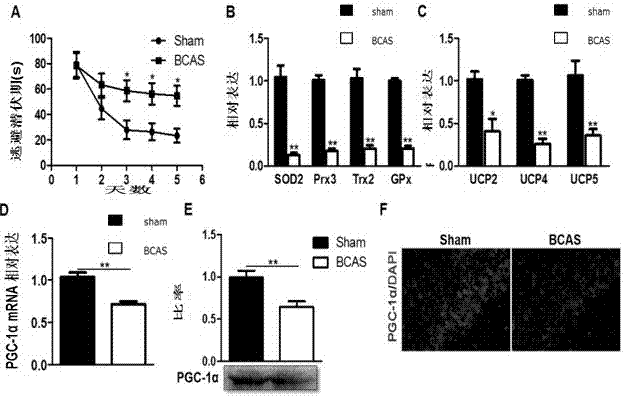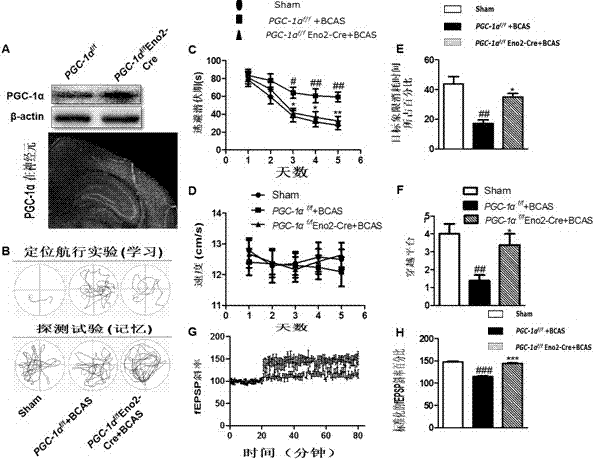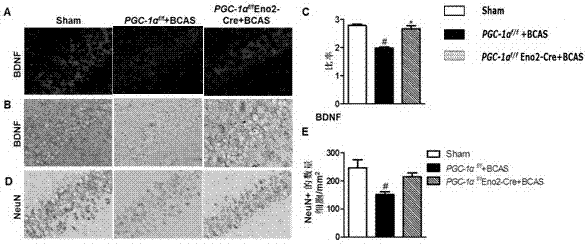Application of PGC-1Alpha (peroxisome proliferator-activated receptor-gamma coactivator-1alpha) in preparation of medicines for treating vascular dementia
A technology of vascular dementia and PGC-1, applied in the field of biochemistry, can solve the problems of insignificant curative effect and unspecific targeting of vascular dementia, and achieve the effect of inhibiting neuroinflammation in the hippocampus and reducing the production of ROS
- Summary
- Abstract
- Description
- Claims
- Application Information
AI Technical Summary
Problems solved by technology
Method used
Image
Examples
Embodiment 1
[0019] Example 1 The learning and memory ability of mice with chronic cerebral ischemia is impaired, the expression of PGC-1α in the hippocampus is reduced, and the mRNA of antioxidants is also reduced
[0020] Wild-type C57BL / 6J mice were induced to form chronic cerebral hypoperfusion by bilateral common carotid artery stenosis (BCAS), and the vascular dementia model was successfully established and confirmed.
[0021] figure 1 A: The mice in the experimental group and the sham operation group learned in the water maze. With the increase of the test days, the average escape time of the mice in the operation group was significantly higher than that in the sham operation group, indicating that the spatial learning ability of the mice in the experimental group was significantly impaired. figure 1 B: qRT-PCR analysis showed that the expression levels of mitochondrial antioxidant mRNA (SOD2, Prx3, Trx2, GPx) in the hippocampus were significantly down-regulated in the operation gro...
Embodiment 2
[0023] Example 2 Overexpression of PGC-1α in neurons can alleviate cognitive dysfunction caused by chronic cerebral hypoperfusion
[0024] To assess mouse performance in the water maze, the LTP assay measures hippocampal synaptic plasticity. To examine the effectiveness of PGC-1α overexpression, the expression of PGC-1α protein was quantified by Western blot experiments. In addition, the expression of IRES-eGFP neurons was observed in frozen sections of brain tissue observed under a fluorescent microscope, indicating the presence of PGC-1α in neurons ( figure 2 A). Test the performance of PGC-1α overexpressed mice in the water maze experiment to determine whether the specific neuron overexpression of PGC-1α is related to the ability of spatial learning and memory. Sham operation group, PGC-1α f / f +BCAS group, PGC-1α f / f A typical swimming route of Eno2-Cre+BCAS mice is shown in figure 2 b. figure 2 C shows that PGC-1α f / f +BCAS group and PGC-1α f / f Compared with ...
Embodiment 3
[0027] Example 3 PGC-1α prevents nerve damage in chronic cerebral hypoperfusion
[0028] Immunohistochemical and Western blot analysis revealed: PGC-1α f / f +BCAS group compared with sham operation group mice, PGC-1α f / f The expression of brain-derived neurotrophic factor BDNF in the hippocampus of mice in +BCAS group was significantly reduced (pf / f Eno2-Cre+BCAS group mice and PGC-1α f / fCompared with mice in +BCAS group, the expression of brain-derived neurotrophic factor was significantly enhanced (p image 3 A-C, image 3 A and B are BDNF images of immunohistochemical staining of brain tissue sections (magnified 200 times); image 3 C is Western blot detection of brain-derived neurotrophic factor). The experimental results showed that overexpression of PGC-1α increased the expression of brain-derived neurotrophic factor BDNF. The number of hippocampal neurons also appeared to be affected by PGC-1α overexpression. Compared with the sham group, PGC-1α f / f The number o...
PUM
 Login to View More
Login to View More Abstract
Description
Claims
Application Information
 Login to View More
Login to View More - R&D
- Intellectual Property
- Life Sciences
- Materials
- Tech Scout
- Unparalleled Data Quality
- Higher Quality Content
- 60% Fewer Hallucinations
Browse by: Latest US Patents, China's latest patents, Technical Efficacy Thesaurus, Application Domain, Technology Topic, Popular Technical Reports.
© 2025 PatSnap. All rights reserved.Legal|Privacy policy|Modern Slavery Act Transparency Statement|Sitemap|About US| Contact US: help@patsnap.com



